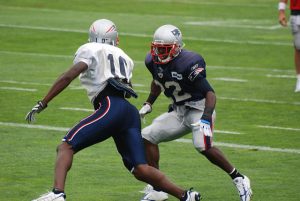 Yesterday, I was reflecting a bit on how surprising one’s life can be. For example, if anyone had asked me five years ago to list all the issues I might be writing about in 2017, two of the last things I would have thought about would have been politics and American football.
Yesterday, I was reflecting a bit on how surprising one’s life can be. For example, if anyone had asked me five years ago to list all the issues I might be writing about in 2017, two of the last things I would have thought about would have been politics and American football.
As we have seen, recent political events have held my interest in this arena more than previously, due to the unprecedented nature of Donald Trump’s rise to power and the issues it raises about effective discourse, authenticity and fake news in a post-truth world. In the weeks to come, I will certainly go back to writing about Clinton and Trump, as there is more to say about their personal storytelling.
Of course, it should be clear that my entries about recent events in the United States are not so much comments on their political significance, but rather about how I analyze this landscape through the lens of narrative.
It is much the same with American football. Today, if I decide to comment about the Super Bowl and the New England Patriots, it is not so much to give my opinion about the event itself. A large part of my interest in this football team stems from the lessons of their remarkable journey. When I reflect on it all, I see valuable insight about organizational culture, leadership, and team building.
The Patriots did in fact win the Super Bowl, in what many experts are calling the most remarkable comeback in history, perhaps even in all of sports. As I watched in disbelief—at 4:30 am in Switzerland—this match wind toward its conclusion, I considered the strange twist of fate that had led to my staying awake for this game.
A few years ago, when my eldest son was four, our family made an extended visit to my parents’ home in Massachusetts. During that time, my father was following the Patriots closely, and taking considerable pride in explaining American football to his grandson. For my part, I had not had more than a passing interest in this sport for a number of years. With a life full of professional and personal activity—most of it based in Europe—I had not watched a full game on television for more than two decades.
As luck would have it, my young son’s interest in the New England team came to pass during the exceptional season of 2014, which culminated in a remarkable Super Bowl victory. Since then, we have both remained at least partially hooked.
Thus, since 2014, we have followed news about the team on their website and in digital media. Personally, I have developed a new appreciation for American football, a game of intricate and endless strategic variations. More importantly, I have gradually come to understand what an outstanding organization the Patriots are, and why they provide a number of lessons for anyone interested in great group performance, regardless of the context.
At the same time, a truly remarkable Super Bowl and my son’s interest in the game would not have been sufficient to incite me to write a blog entry about the New England Patriots. Rather, it was another coincidence that led me to the topic. This week also saw the publication of the latest issue of the Harvard Business Review, which contains two articles that I found germane to my thinking about sports teams and their lessons for other types of organizations.
The first of these articles concerns the role of talent and star performers in a corporate context. Bain & Company analyzed productivity at 25 global companies, and they concluded that, contrary to popular belief, the best companies do not have more star talent than their competitors. What they do have is a better way of deploying their top performers. It seems to me that the New England Patriots are an outstanding example of this concept, and it is a topic I plan to address in the weeks to come.
The second HBR piece, entitled “Why Sports Are a Terrible Metaphor for Business”, comes from Bill Taylor, who cofounded Fast Company magazine. The author warns us about the temptation to look for business lessons on fields of play. As he sees it, notions of competition and strategy are so vastly different in the two domains that one is of limited relevance to the other. While I agree with some of Taylor’s assertions, I believe nonetheless that all of us who care about extraordinary group performance can learn a good deal from highly successful sports teams. So, we have yet another subject for consideration here. More on this next time.
Image: Flickr-user Brian J. McDermott
